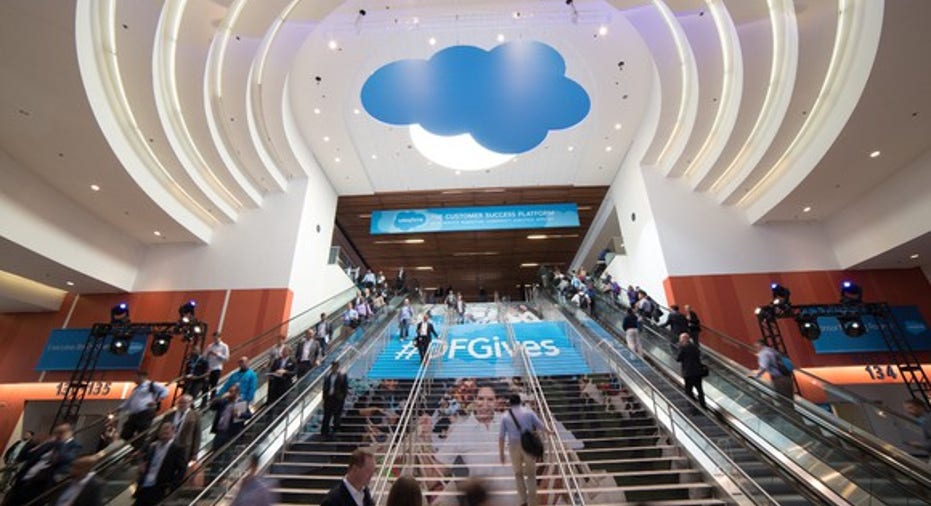5 Reasons I Bought Salesforce.com, Inc. Stock

Shares of Salesforce (NYSE: CRM) fell 4% on Sep. 1 after the cloud-based CRM (customer relationship management) solution provider postedits second quarter earnings. The headline numbers looked solid -- revenue rose 25% annually to $2.04 billion, exceeding estimates by $20 million, and non-GAAP earnings improved 26% to $0.24 per share, topping expectations by two cents.
Image source: Getty Images.
However, Salesforce's billings only rose 15%, down from 30% growth in the previous two quarters and missing expectations for 25% growth. The company blamed that miss on delays in closing several big deals in the U.S.Salesforce expects its third quarter sales to rise 23.4%-24% annually in the third quarter, but that also misses the consensus forecast for 24.6% growth. Due to that decline, its forecast for non-GAAP earnings of $0.20-$0.21 per share also missed expectations for $0.24 per share.
Those numbers were disappointing, but I think the sell-off was overdone. Therefore, I started a position in Salesforce on the dip for three simple reasons.
1. It raised its full-year guidance
Many investors were so focused on Salesforce's weak billings growth and third quarter guidance that they ignored the fact that the company actually raised its full-year sales growth guidance to 24%-25%, compared to its prior forecast for 22%-23% growth.
A key growth driver in the near future will be the launch ofSalesforce Einstein, its next-gen AI platform for CRM. The company plans to unveil the platform, along with other Einstein-powered services, at its annual Dreamforce event in early October.
Dreamforce 2015. Image source: Salesforce.
During the conference call, CEO Marc Benioff said that the platform would "democratize artificial intelligence" and "make every company and every employee smarter, faster, and more productive." He also called the platform "a huge differentiator and growth driver going forward, as it puts us well ahead of our CRM competition once again."
2. Still the undisputed leader
Salesforce is still the undisputed leader in the CRM market. Research firm Gartnerreports thatSalesforce controlled 19.7% of the global CRM market in 2015, compared to 10.2% for SAP, 7.8% for Oracle, 4.3% for Microsoft, and 3.6% for Adobe.
SAP and Oracle lost market share year-over-year, but Salesforce, Microsoft, and Adobe all gained market share. Salesforce posted the highest growth with a 1.5 percentage point gain.
In terms of pure revenue growth, Adobe's CRM sales rose 26.9% in 2015, Salesforce's grew 21.1%, and Microsoft's improved 20%. All three companies' businesses outpaced the global CRM market's 12.3% growth to $26.3 billion last year.
3. Robust growth across all business segments
Salesforce's subscription and support revenues rose 24% annually to $1.89 billion last quarter, while professional services and other revenues grew 33% to $151 million. During the call, Benioff noted that "no other software enterprise company of our size is growing at this pace."
Sales Cloud revenue rose 13% annually in dollars, Service Cloud revenue rose 29%, and App Cloud and other revenue rose 43%. Marketing Cloud revenue, boosted by its $2.8 billion acquisition of Demandware, rose 28%.
4. Overseas growth and margins remain strong
Salesforce's revenue from the Americas, which accounted for 73% of its top line, rose 24% annually during the quarter. But its overseas markets are growing faster, with 32% growth across the EMEA (Europe, Middle East, and Africa) region and 29% growth in the Asia-Pacific region.
Although currency headwinds remain challenging, CFO Mark Hawkins stated during the conference call that the foreign exchange rates mainly put pressure on its revenue growth instead of boosting operating expenses -- which allowed it to continue expanding its margins. That enabled its non-GAAP operating margin to improve 25 basis points year-over-year, representing its ninth consecutive quarter of margin expansion.
5. Reasonable valuations
Salesforce is often called an "expensive" stock, but its current (TTM) price-sales ratio of 7 isn't that high compared to some of its other cloud peers. Veeva, which provides Salesforce services for the healthcare industry, is expected to post 28% sales growth this year and trades at 12 times sales. Analysts expect Adobe, which trades at 10 times sales, topost 21% sales growth this year. Moreover, the application software industry currently hasan average P/S ratio of 9.
The bottom line
Salesforce is a volatile stock which isn't for investors with weak stomachs. But I believe that it's a solid "pure play" cloud stock with lots of room to grow as cloud-based CRM solutions displace on-premise ones. Therefore, I consider Salesforce's recent pullback a great opportunity to start a long-term position.
A secret billion-dollar stock opportunity The world's biggest tech company forgot to show you something, but a few Wall Street analysts and the Fool didn't miss a beat: There's a small company that's powering their brand-new gadgets and the coming revolution in technology. And we think its stock price has nearly unlimited room to run for early in-the-know investors! To be one of them, just click here.
Leo Sun owns shares of Salesforce.com. The Motley Fool owns shares of and recommends Gartner, Salesforce.com, and Veeva Systems. The Motley Fool owns shares of Microsoft and Oracle. The Motley Fool recommends Adobe Systems. Try any of our Foolish newsletter services free for 30 days. We Fools may not all hold the same opinions, but we all believe that considering a diverse range of insights makes us better investors. The Motley Fool has a disclosure policy.



















